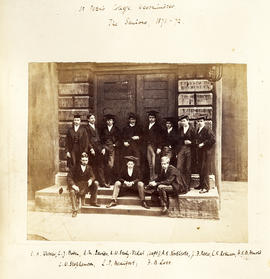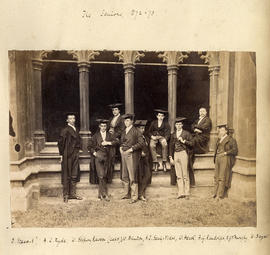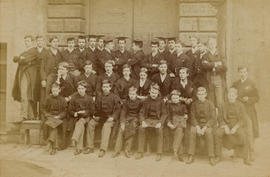[00:43] Family background and personal history. [03:15] Westminster Under School at Little Dean’s Yard. Description of College post-war. [04:25] Memories of sport - football at Grove Park, Vincent Square, Old gym in the Abbey. [06:14] Westminster at the end of Second World War and post-war years. Memories of science lessons. [11:16] Memories of History Master, and Master in charge of Gym. [12:25] Day boy at Busby’s. ‘Honorary King’s Scholar’, sitting the Challenge. Stayed overnight once, kept awake by Big Ben. [15:00] Rowing successes and failures. [17:02] Transition from Under School to Great School. New schoolmates and teachers. [21:04] Music lessons, piano duets. ‘Far too many plays’. Choir concerts. [24:30] Changeover of Head Masters from John Christie to Walter Hamilton. Dislike of the change. [27:05] Taught a maths class in absence of teacher. [28:14] Elizabethan. [30:29] College Street Clarion. Fisher as Housemaster. [34:28] Latin prayers. [35:38] CCF and Scouts. Scout arrested for dressing up as a girl. [39:40] School food, Free School Milk Act. [42:04] Divide between school subjects, hierarchy. [46:53] Trinity College, Cambridge. Election. Scholarship exam. [51:23] Rebuilding of College post-war. Temporary roof of School. [53:38] Knowledge of other houses. [54:50] Liddell’s. [58:50] Gym display, held in College Garden. Parents’ party. [01:05:40] Rowing, Godsey White’s attitudes to rowing. [01:19:33] Challenge subjects. Languages. [01:22:05] Russian, useful in Navy. [01:25:30] Strikes, walking to school.
[0.53] Why he became a teacher. Had worked in industry selling nickel alloys – always had teaching in the back of his mind. Father did not want him to teach – did not pay well enough, and would never see real world outside of schools. [1.53] Taught chemistry. Studied natural sciences, but had broad education which was helpful. [2.20] How he came to teach. Chemistry master suddenly had to leave – sudden vacancy was lucky since he had no qualifications other than degree. Had joined CCF (Combined Cadet Force) but disliked. Enjoyed rowing, tied in well with job. Easier to get there in those days. [3.50] Enjoyed ‘God Soc’, good link to the Abbey. There are now nearly sixty such societies. [4.50] Houses. Originally tutor in Busby’s from 1956. House Master of Rigaud’s in 1964. Master of the Queen’s Scholars in 1967, liked connections with Abbey. At the time Master of the Queen’s Scholars was Under Master. Got to know parents well. Asked to become Master, no application process. [7.30] John Rae. Rogers becomes Headmaster of Malvern in 1971. John Rae became Head Master year before Rogers left for Malvern. Knew him well from Somerset. Extra work with change of Head Master as Under Master. Controversial figure but did much for the school. Always seen on television, helped to raise funds etc. Parsimonious place, ordeal to move out. Jane Rogers had baby in hospital as the House Master’s bedroom was insufficiently private! College much more private. [13.00] House in College much more spacious. Ground floor for music practice and bookbinding; drawing room and upper two floors for them. Top floor is now an additional flat. No ghosts ever spotted. [15.10] Lodged first female pupil at that time in spare room. Had family connections to school – brother there too – but apprehensive to walk out into Yard. In 1970s girls primarily came for supplementary science lessons. [17.40] Science teaching. Mentions ‘Crump’ (Cyril John Crumpler), Geoffrey Foxcroft, Muffet (David William Muffett). Science still considered by older teachers to be inferior (to classics. Subject still developing at Westminster despite its being around on the curriculum for a while. Rogers enjoyed science very much, especially the practical aspect. Facilities not impressive by modern standards, but improved a lot and modernised during his time. Parents came to science open days. Only footage of science then is film of Queen visiting Sutcliff’s – greater event then than now. [23.55] His idea to begin Film Society, based in Busby’s. Started off as Busby’s affair, spread throughout the school. John Carlton at ease with cameras. Contrast with predecessor, Walter Hamilton – though he was nice too, first took him on as a teacher. Resentment (mocking) when he left for Rugby. By modern standards seven years is reasonable. Teachers staying too long has a ‘deadening’ effect. Hamilton returned to Magdalene College, Cambridge after Rugby. [29:50] Under Masters. Now expected to move on and become heads after five years. Not standard in Rogers’ time, but happened on occasion. [31:00] Jim Cogan. Could be very brusque – Rogers did not experience this, but may have been concentrating more on moving. Big decision for John Rae to appoint successor as Under Master. [33:00] Staying at Rigaud’s for only three years was the wrong thing to do – for children and parents. [33:55] Different houses had different characters. College particularly different – special responsibilities. Defining feature of Rigaud’s ‘totally mad cook’ – huge underground kitchens dripping with water, rodents, gas leaks. Many foreign staff, tenuous jobs. [37:55] Spanish cook in Busby’s could be bribed to drop teapot in important moment in prayers, sing songs. One Finnish maid amongst them. Broke hand cleaning early in morning and had to wake House Master up – most dramatic thing to happen. [39:20] Busby’s. Enjoyed working for House Master (‘boss’) as tutor. Had to stand in once for him – would now be called Resident Tutor. [41:00] Could park in Great College Street without a problem – unthinkable today. Unlike other boarding schools, Westminster was relaxed and not isolated. [42:00] Lycée Janson (Lycée Janson de Sailly) used to come each year, once found climbing out of Dean’s Yard to get out instead of opening the gate. [43:00] Footage of one pupil saying ‘there are no bounds’ at Westminster. Provenance unclear. [44:00] Different and freer atmosphere with less security. Used to run out at break to get theatre tickets. [46:00] Much more difficult to discipline – Westminster on doorstep, how to find anyone who has left? This liberalism is generally positive. Academic pressure has forced structure. In past five/ten years this has accelerated; greater risk of failure. Consequent loss of breadth. Sport has improved, if not main attraction. [50:00] Scholars particularly musical, Rigaud’s good jazz band. Can remember Roger Norrington conducting as a pupil. [51:20] Main differences since ‘60s. New buildings are main difference– out of Dean’s Yard makes it less centralised and less frantic. Actual classroom activity largely unchanged. [53:10] Election. Only half school around by the end of Election Term due to study leave. Election Dinner return from School to College Hall. Trying to slim down excess – music in particular: ‘vested interests’. Trying to bring more in from Westminster – had to reduce numbers of teacher as Common Room grew. [58:00] Yard cricket/football controversial since surface is being redone. Conspiracy theory has that surface is being changed in order to prevent Yard games. Cobbled pathways to stay. Rigaud’s has been cleaned and is very bright; some wish it hadn’t been cleaned. New sports’ centre – art deco building, mainly used by Under School. [1:05:00] Much more weekly boarding at Westminster than other boarding schools. [1:06:00] Decline of corporal punishment. Much more difficult to get rid of at Malvern; occasionally used at Westminster. Much more progressive attitudes in city boarding school. Two demonstrations in ‘60s, largely diffused by John Carlton. [1:08:00] Thames flood. Woke up once with loudspeakers bleating ‘danger of flooding’. Barrier erected to prevent floods. [1:10:20] Tyburn constantly dripped in Rigaud’s basement. Now Under Master’s house. Gutter went through house and discharged rainwater. [1:14:45] Commem. Thinking of making compulsory – not same atmosphere without whole school. [1:16:45] London makes big difference to school. New Head Master (PSJD) has much experience but none in London. As mentioned, much more liberal. Head Master and family living in Vincent Square – ‘radical change’. Headmasters have not lived in Little Dean’s Yard since David Summerscale (1986). Much more like normal house than awkward atmosphere of Lord North Street. [1:23:25] School has no longer any property on Eccleston Square. All moved to Vincent Square. Big expansion in property owned by school, especially along Victoria Line. Lord North Street property and 4 and 5 Barton Street have been sold.
Title and names of all individuals on separate sheet.


